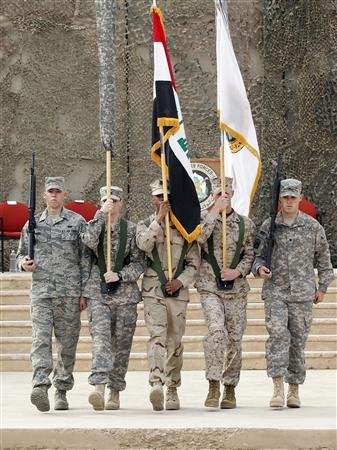US military marks end of its war in Iraq
Updated: 2011-12-15 19:18
(Agencies)
|
|||||||||||
BAGHDAD - The US military officially ended its war in Iraq on Thursday, packing up a military flag at a ceremony with US Defense Secretary Leon Panetta nearly nine years after the invasion that ousted Saddam Hussein.
The last 4,000 American troops will withdraw by the end of the year, leaving Iraq still tackling a weakened but stubborn insurgency, sectarian tensions and political uncertainty.
"After a lot of blood spilled by Iraqis and Americans, the mission of an Iraq that could govern and secure itself has become real," Panetta said at the ceremony.
US soldiers rolled up the flag for American forces in Iraq and slipped it into a camouflage-colored sleeve.
Nearly 4,500 US soldiers and tens of thousands of Iraqis lost their lives in a war that began with a "Shock and Awe" campaign of missiles pounding Baghdad, but later descended into a bloody sectarian struggle between long-oppressed majority Shi'ites and their former Sunni masters.
Saddam is dead, an uneasy politics is at work and the violence has ebbed. But Iraq still struggles with the insurgency, a fragile power-sharing government and an oil-reliant economy plagued by power shortages and corruption.
In Falluja, the former heartland of an al Qaeda insurgency and scene of some of the worst fighting in the war, several thousand Iraqis celebrated the withdrawal on Wednesday, some burning US flags and waving pictures of dead relatives.
Iraq's neighbors will keep a close watch on how Baghdad will confront its problems without the buffer of a US military presence, while a crisis in neighboring Syria threatens to upset the region's sectarian and ethnic balance.
US President Barack Obama, who made an election promise to bring troops home, told Iraqi Prime Minister Nuri al-Maliki that Washington will remain a loyal partner after the last troops roll across the Kuwaiti border.
Iraq's Shi'ite leadership presents the withdrawal as a new start for the country's sovereignty, but many Iraqis question which direction the nation will take once US troops leave.
Some fear more sectarian strife or an al Qaeda return to sow terror in the cities. A squabble between Kurds in their northern semi-autonomous enclave and the Iraqi Arab central government over disputed territories and oil is another flashpoint.
Violence has ebbed since the bloodier days of sectarian slaughter when suicide bombers and hit squads claimed hundreds of victims a day at times as the country descended into tit-for-tat killings between the Sunni and Shi'ite communities.
In 2006 alone, 17,800 Iraqi military and civilians were killed in violence.
Iraqi security forces are generally seen as capable of containing the remaining Sunni Islamist insurgency and the rival Shi'ite militias US officials say are backed by Iran.
But even for those enjoying a sense of sovereignty, security is still a major worry. Attacks now target local Iraqi government offices and security forces in an attempt show that the authorities are not in control.
"I am happy they are leaving. This is my country and they should leave," said Samer Saad, a soccer coach. "But I am worried because we need to be safe. We are worried because all the militias will start to come back."
Related Stories
Massive US embassy in Iraq 2011-12-15 16:34
US, Iraq building long-term partnership: Obama 2011-12-13 06:35
US, Iraq to start new phase of ties 2011-12-01 09:33
US officer in Iraq on historic mission 2011-11-19 07:54
Most US troops to leave Iraq by mid-Dec 2011-11-04 09:10
Hot Topics
HIV/AIDS, Egypt protest, Thanksgiving, climate change, global economic recovery, home prices, high-speed railways, school bus safety, Libya situation, Weekly photos
Editor's Picks

|

|

|

|

|

|








